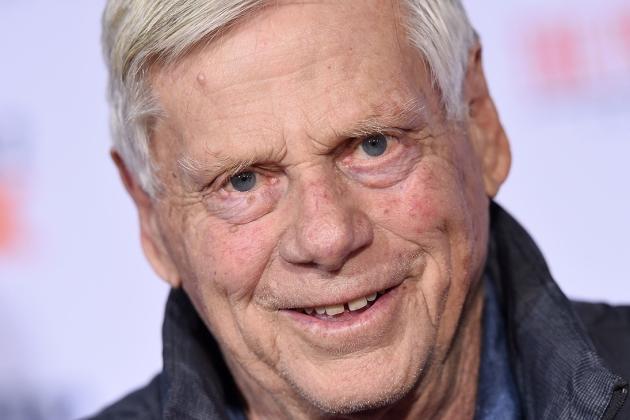
Robert Morse, the Tony Award-winning star of How to Succeed in Business Without Really Trying who impressed a new legion of fans as the eccentric head of the Sterling Cooper ad agency on Mad Men, has died. He was 90.
“My good pal Bobby Morse has passed away at age 90,” writer/producer and vp on the board of governors of the Academy of Motion Picture Arts and Sciences Larry Karaszewski tweeted. “A huge talent and a beautiful spirit. Sending love to his son Charlie & daughter Allyn. Had so much fun hanging with Bobby over the years – filming People v OJ & hosting so many screenings (How To Succeed, Loved One, That’s Life).”
More from The Hollywood Reporter
His son Charlie also confirmed Morse’s death to Eyewitness News, KABC-TV reported.
Morse became a show business sensation with his turn as the ambitious J. Pierrepont Finch, who goes from New York window washer to chairman of the board of the World Wide Wicket Co. in How to Succeed in Business Without Really Trying, based on Shepherd Mead’s best-selling book.
The show, which debuted in October 1961 and ran for more than 1,400 performances through March 1965, collected seven Tonys as well as the 1962 Pulitzer Prize for Drama, with Morse singled out for best actor in a musical. (Also among the winners: director Abe Burrows and actor Charles Nelson Reilly.)
Morse then reprised the role of Finch for the 1967 film adaptation of How to Succeed from The Mirisch Co. and United Artists.
In 1990, the Massachusetts native received another Tony, this one for best featured actor in a play, for his spell-binding turn as Truman Capote in the one-hander Tru. A live performance taped for PBS’ American Playhouse netted him an Emmy Award three years later.
Younger audiences, however, know the 5-foot-5, gap-toothed actor for his turn as Sterling Cooper co-founder Bert Cooper, a man fond of bow ties, Japanese art and feet minus shoes, on seven seasons of AMC’s Mad Men. He received five Emmy noms for his work on the Matthew Weiner period drama.
Morse dusted off his Broadway musical skills when he did a song-and-dance routine to the tune of “The Best Things in Life Are Free” after Bert died peacefully in 1969 while watching TV as Neil Armstrong walked on the moon.
[embedded content]
In a 2014 interview with Rolling Stone magazine, Morse said Weiner always intended for him to sing on the show. The actor, though, had to be persuaded.
“It wasn’t just, ‘Go and sing a song and au revoir, Bobby.’ It was Bert telling Don [Jon Hamm’s character]: What are you doing? All this shit that you’re doing, cut it out. The best things in life are free. We just landed on the moon. Calm down. Enjoy things while you have them.
“I saw how the scene fit into the whole picture and thought: ‘Wow. This gives things a lot of perspective here. Let’s do it.’ We rehearsed for a few days and then just filmed it over the course of a day or so. No one else knew we were doing it.”
The boyish Morse also starred in several light-hearted movie comedies of the 1960s. He played a British man overseeing his uncle’s expensive funeral in The Loved One (1965), directed by Tony Richardson, and advised Walter Matthau on how to cheat on one’s wife without getting caught in A Guide for the Married Man (1967).
Robert Morse was born on May 18, 1931, in Newton, Mass. His father owned a chain of movie theaters, and his mother studied piano at the New England Conservatory of Music.
After serving in the Korean War, Morse trained at the American Theatre Wing in New York in the early ’50s and landed a job as a rehearsal singer on Name That Tune. An agent heard him and signed him up, and Morse would appear as a wounded soldier in The Proud and the Profane (1956).
Morse made his Broadway debut in 1955 appearing alongside Ruth Gordon in the original production of The Matchmaker, written by Thornton Wilder. (He also played apprentice Barnaby Tucker in the 1958 Paramount version.)
Morse received his first Tony nom in 1959 for playing a greenhorn Broadway producer in Say, Darling, about the making of The Pajama Game (with book and direction by Burrows), then landed another nom the following year for his work in Take Me Along, a musical version of Eugene O’Neill’s Ah, Wilderness! that also starred Jackie Gleason and Walter Pidgeon.
He was nominated one more time in 1973 for Sugar, portraying Jerry/Daphne (Jack Lemmon’s character) in the musical adaptation of Billy Wilder’s Some Like It Hot. And he had a delightful cameo in the 2016 Broadway revival of The Front Page.
Morse is one of only four actors to win the top acting Tonys for play and musical, sharing that distinction with Rex Harrison, Christopher Plummer and Zero Mostel.
Yet despite all his success on the stage, Morse never made it big in the movies.
“He had this incredible sense of comedy and this wonderful lightness and fluidity. He was a little bit strange and a little bit outrageous. But he just did better in the theater than in film,” Richardson said of Morse in a 1990 story for New York magazine. “He made contact with a theater audience and could take them along in his pocket. But in a film, the audience has to enter your head. You don’t go out to them — they have to come in to you.”
His big-screen résumé also included Honeymoon Hotel (1964), Where Were You When the Lights Went Out? (1968), The Boatnicks (1970) and The Emperor’s New Clothes (1987).
Morse also sang and danced when he starred with E.J. Peaker as a young married couple on the 1968-69 ABC series That’s Life. He had a recurring role on the 2000 Steven Bochco hospital drama City of Angels, played Harry the Bookie on All My Children and was Grandpa in a 1995 Munsters TV movie.
More recently, Morse portrayed journalist Dominick Dunne on American Crime Story: The People v. O.J. Simpson.
He was married for 20 years to actress and dancer Carole D’Andrea, then married Elizabeth Roberts, more than 30 years his junior, in 1989.
For Morse, working on both Mad Men and How to Succeed in Business Without Really Trying tied his career together quite nicely.
“It was very odd,” he said in the Rolling Stone piece, “because the first day I went on the set [of Mad Men], I thought I’d walked into the road company production of How to Succeed: There were secretaries and desks everywhere, there were vintage phones all over the place, everyone was done up like it was 1960.
“I remember waltzing up the aisles and singing, ‘A secretary is not a toy, no, my boy/her pad is to write in, and not spend the night in! [lyrics from the How to Succeed song “A Secretary Is Not a Toy”].’ And everybody looked at me like I was crazy, because they’re all so damned young!
“The point is, it was both a reflection of who I was then and a bit of time warp. It reminded me of what a great era that first half of the ’60s were — the Kennedy era. John Kennedy came to see me in How to Succeed and gave me a signed picture; I used to hang out in Bobby Kennedy’s place down in Virginia. They were wonderful days, the sun was out, our sleeves were rolled up. It was all very positive, for the most part. And then what happened?”
Best of The Hollywood Reporter




